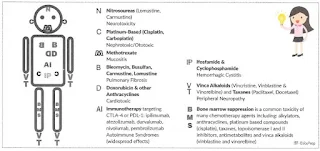Chemotherapy Side Effects
Introduction
In general, cancer cells are cells that tend to grow extraordinarily fast in our body and chemotherapy works by targeting these actively dividing cells. However, chemotherapy is not specific in their action, and hence our normal, healthy cells that are fast-growing are also damaged. Hence, the patient experience side effects.
The normal cells that are fast growing are
- Hair follicles
- Blood-forming cells in the bone marrow
- Cells in the mouth, digestive tract, and reproductive system
NOTE: Chemotherapy safety at home is discussed separately.
Hair Loss (Alopecia)
Depending on the type of drug received, hair (body hair and scalp hair) may be unaffected, thinned, or completely fall out.
- Hair loss may start anywhere from 7 to 21 days after the first chemotherapy session.
- It will grow again following the completion or termination of chemotherapy, it may have a different texture or colour, but these changes are usually temporary.
- Near total hair loss is expected with doxorubicin, etoposide and ifosfamide.
Head covers such as scarves, hats and wigs may be considered.
Myelosuppression
All cytotoxic drugs except vincristine sulphate and bleomycin cause bone-marrow suppression.
- This commonly occurs 7 to 10 days after administration, but is delayed for certain drugs, such as carmustine, lomustine, and melphalan.
- Peripheral blood counts must be checked before each treatment, and doses should be reduced or therapy delayed if bone-marrow has not recovered.
- Because white cells and platelets have shorter life spans in the circulation, they are the first to be affected by myelosuppression but generally recover rapidly.
Infection
- Febrile neutropenia is defined as neutropenia and a single oral temperature of 38.3°C or more or a temperature of 38.0°C or more for at least 1 hour. Neutropenic patients are at an elevated risk of developing serious and life-threatening infections. Therefore, prompt investigation and treatment are essential.
- Advice patient on good personal hygiene to minimize risk of infection.
- Regular handwashing
- Wear protective mask at crowded areas
- Avoid uncooked food
- Prophylaxis for PCP may be indicated in haematological malignancies, some solid tumours, haemopoietic stem cell transplantation and in patients receiving selected chemotherapy regimens or prolonged, high doses of corticosteroids.
Bleeding
- Seek immediate medical attention if develop any symptoms of thrombocytopenia (e.g. unexplained bruises and prolonged bleeding).
- Brush teeth with a soft toothbrush. Do not use dental floss or toothpicks.
Anaemia
- Signs and symptoms of anaemia include weakness and fatigue, irritability, tachycardia and palpitations, shortness of breath, chest pain, pale appearance, dizziness, decreased mental acuity, ecchymoses, blood in urine or stool, and hematomas.
- Fatigue
- Get plenty of rest and sleep.
- Perform daily activities and exercise as tolerated.
- Red cell transfusion should be based on clinical criteria, rather than absolute trigger values, but usually only given when Hb <10g/dL.
NOTE: Fatigue can be due to the cancer itself, side effects from the treatment or the emotional aspects of dealing with cancer and cancer pain.
Nausea and Vomiting
Nausea and vomiting cause considerable distress to many patients who receive chemotherapy and to a lesser extent abdominal radiotherapy, and may lead to refusal of further treatment; prophylaxis of nausea and vomiting is therefore extremely important.
Symptoms may be
- Acute: Some patients experience nausea and vomiting within 24 hours of receiving chemotherapy.
- Delayed: Some patients develop nausea and vomiting 24 hours after a dose of chemotherapy and is common with cisplatin, carboplatin, cyclophosphamide and doxorubicin. Delayed vomiting due to cisplatin usually peaks after 48-72 hours and can last 6-7 days.
- Anticipatory: Some patients may begin to feel ill from chemotherapy, even before their treatment begins. The sight, sound, or smell of the treatment room can trigger anticipatory nausea and vomiting.
Patients vary in their susceptibility to drug-induced nausea and vomiting; those affected more often include women, patients under 50 years of age, anxious patients, and those who experience motion sickness. Susceptibility also increases with repeated exposure to the cytotoxic drug.
Coping strategies include
- Eat and drink slowly. Try having small frequent meals throughout the day instead of usual portion of breakfast, lunch, and dinner.
- Avoid sweet, fried, or fatty foods, as well as foods with strong smell.
- Eating cold foods or at room temperature can help to avoid strong smells.
- Taking anti-nausea and vomiting medicines.
Peripheral Neuropathy
Many chemotherapy drugs can cause a cumulative symmetrical sensory neuropathy which is frequently dose-limiting. Examples include:
- Cisplatin (usually at cumulative doses >400mg/m2) and oxaliplatin (cumulative dose >640mg/m2)
- Taxanes
- Vincristine
Patients might experience numbness or tingling in hands and feet. Symptoms related to nerve damage include:
- Difficulty in picking up objects or buttoning clothes.
- Problems with balance (e.g. prone to falls).
- Difficulty in walking.
- Hearing loss/reduced hearing.
It is important to inform doctor as soon as possible if these side effects occur.
Pregnancy and Fertility Problems
Many antineoplastics are teratogenic. Hence, it is important to ensure effective contraception (including the partners of treated males) during treatment, and for up to 3-6 months after stopping antineoplastics.
- The length of time depends on the antineoplastic used and its potential teratogenic effects.
The side effects of chemotherapy can cause certain physical changes in men and women such as temporary or permanent sterility, depending on the drug, dosage and time of chemotherapy.
- Those with an alkylating drug or procarbazine carry the risk of causing permanent male sterility.
Other Common Side Effects
- Appetite changes
- Constipation
- Diarrhoea
- Skin and nail changes such as dry skin and photosensitivity.
- Mucositis
- Weight changes
- Secondary malignancies
Summary
Every person does not get every side effect, and some people get few, if any.
- The severity of side effects varies greatly from person to person.
- Often, side effects go away fairly quickly after treatment ends.
- Nonetheless, there are chemo drugs which potentially cause long-term side effects.

Comments
Post a Comment